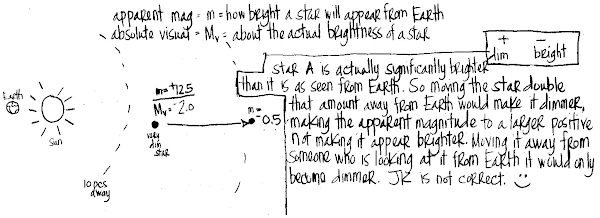Cuesta College, San Luis Obispo, CA
An astronomy question on an online discussion board[*] was asked:
JK: A star has an apparent magnitude of +12.5 and an absolute magnitude of –2.0. If the star is moved twice as far away (distance is doubled), would its apparent magnitude then be –0.5? I don't know if I am correct.Discuss why this reasoning is incorrect, and how you know this. Explain using the relationships between apparent magnitude, absolute magnitude, and distance.
[*] answers.yahoo.com/question/index?qid=20090216102612AAzRHWy.
Solution and grading rubric:
- p:
Correct. Understands difference between apparent magnitude m (brightness as seen from Earth, when placed at their actual distance from Earth) and absolute magnitude (M (brightness as seen from Earth, when placed 10 parsecs away), and discusses how placing a star farther away will affect its apparent magnitude, making it dimmer (a larger positive number than +12.5) instead of brighter (the incorrect value of –0.5). - r:
Nearly correct (explanation weak, unclear or only nearly complete); includes extraneous/tangential information; or has minor errors. - t:
Contains right ideas, but discussion is unclear/incomplete or contains major errors. - v:
Limited relevant discussion of supporting evidence of at least some merit, but in an inconsistent or unclear manner. At least attempts to use relationships between apparent magnitudes, absolute magnitudes, and distances. - x:
Implementation/application of ideas, but credit given for effort rather than merit. Discussion based on garbled definitions of, or not based on proper relationships between apparent magnitudes, absolute magnitudes, and distances. - y:
Irrelevant discussion/effectively blank. - z:
Blank.
Section 70160
Exam code: midterm02n4Rs
p: 7 students
r: 6 students
t: 15 students
v: 2 students
x: 3 students
y: 0 students
z: 0 students
A sample "p" response (from student 0500):

No comments:
Post a Comment